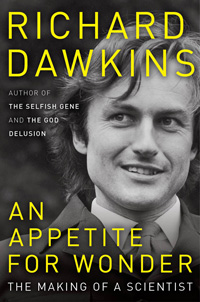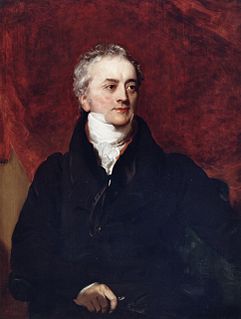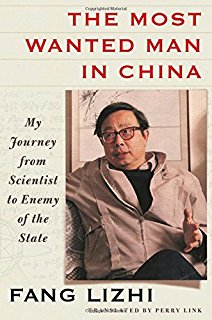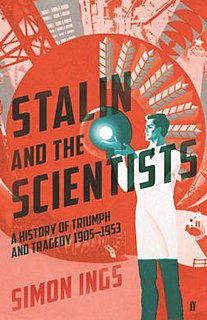 W
WAge of Science (2005) is a book about science in the 20th century by author and Egyptian-American scientist, and the winner of the 1999 Nobel Prize in Chemistry Ahmed Zewail. The book is also a biography and autobiography about Ahmed Zewail.
 W
WAlan Turing: The Enigma (1983) is a biography of the British mathematician, codebreaker, and early computer scientist, Alan Turing (1912–1954) by Andrew Hodges. The book covers Alan Turing's life and work. The 2014 film The Imitation Game is loosely based on the book, with dramatization.
 W
WAmerican Eclipse is a book by David Baron about the popular impression of the 1878 solar eclipse as observed across the United States. Its full subtitle is, "A Nation's Epic Race to Catch the Shadow of the Moon and Win the Glory of the World".
 W
WAn Appetite for Wonder: The Making of a Scientist is the first volume of the autobiographical memoir by British evolutionary biologist Richard Dawkins. The hardcover version of the book was published in both the United Kingdom and the United States on 12 September 2013, and covers Dawkins's childhood, youth, studies and early career up to the writing of The Selfish Gene. A second volume, Brief Candle in the Dark: My Life in Science, covering the remaining part of his life, was released in September 2015.
 W
WBenjamin Franklin: An American Life is a non-fiction book authored by American historian and journalist Walter Isaacson. Published in 2003 by Simon & Schuster, the biographical work details the life and times of prominent U.S. statesman Benjamin Franklin. The book has received praise from multiple publications including Foreign Affairs and The Guardian.
 W
WBrief Candle in the Dark: My Life in Science is the second volume of the autobiographical memoir by British evolutionary biologist Richard Dawkins. It was published in English in September 2015.
 W
WBrighter than a Thousand Suns: A Personal History of the Atomic Scientists, by Austrian Robert Jungk, is the first published account of the Manhattan Project and the German atomic bomb project.
 W
WA Dominant Character: The Radical Science and Restless Politics of J. B. S. Haldane is a biography of J. B. S. Haldane, British-Indian geneticist, communist and writer; written by Samanth Subramanian and published by Simon and Schuster in 2019.
 W
WThe Idea Factory: Bell Labs and the Great Age of American Innovation is a 2012 book by Jon Gertner that describes the history of Bell Labs, the research and development wing of AT&T, as well as many of its eccentric personalities, such as Claude Shannon and William Shockley. It is Gertner's first published book.
 W
WImagining the Elephant: A Biography of Allan MacLeod Cormack is a 2008 biography of physicist and Nobel laureate Allan MacLeod Cormack written by biomedical engineer and author Christopher Kit Vaughan and published by Imperial College Press. The book won the University of Cape Town Book Award in 2010, an honour shared with Nobel laureate J.M. Coetzee who won the award in 1984 for Waiting for the Barbarians.
 W
WThe Invention of Nature: Alexander von Humboldt's New World is a nonfiction book released in 2015, by the historian Andrea Wulf about the Prussian naturalist, explorer and geographer Alexander von Humboldt. The book follows Humboldt from his early childhood and travels through Europe as a young man to his journey through Latin America and his return to Europe. Wulf makes the case that Humboldt synthesized knowledge from many different fields to form a vision of nature as one interconnected system, that would go on to influence scientists, activists and the public.
 W
WJoseph Banks: A Life (1987), is a biography by Patrick O'Brian of the 18th-century English naturalist, botanist and explorer Joseph Banks. It was first published by The Harvill Press, London. O'Brian is better known for his Aubrey–Maturin series of historical novels based on the Royal Navy during the Napoleonic period. That series occasionally mentions Sir Joseph Banks in his role in the Royal Society, and has a main character and several occasional characters who pursue natural philosophy, observing and collecting specimens to add to scientific knowledge.
 W
WThe Last Man Who Knew Everything (2006), written by Andrew Robinson, is a biography of the British polymath Thomas Young (1773–1829).
 W
WLeonardo da Vinci is a 1996 children's biography by Diane Stanley. The book looks at da Vinci's life and accomplishments.
 W
WLilavati's Daughters is a collection of nearly a hundred biographical essays on women scientists of India. Published by Indian Academy of Sciences (Bangalore) in 2008, the book was edited by Rohini Godbole and Ram Ramaswamy. Reviews have appeared in The Hindu, Nature and C&E News among other places. The book contains brief biographical and autobiographical sketches of women scientists working in India. Covering a range of disciplines, in these essays the scientists talk of what brought them to science, what kept their interest alive, and what has helped them achieve some measure of distinction in their careers. This collection represent the cultural diversity of the country as well as a diverse range of disciplines, so that any student could gain from the insights and experiences of professional women to whom they may be able to relate at many levels.
 W
WMen, Microscopes, and Living Things is a children's book written by the American author Katherine Shippen and illustrated by Anthony Ravielli. The book was first published in 1955 and is a 1956 Newbery Honor recipient.
 W
WA Mind at Play: How Claude Shannon Invented the Information Age is a biography of Claude Shannon, an American mathematician, electrical engineer, and cryptographer known as "the father of information theory". The biography was written by Jimmy Soni and Rob Goodman, and published by Simon & Schuster in 2017. A Mind at Play is the second biography co-authored by Soni and Goodman, the first being a biography of Cato entitled Rome's Last Citizen.
 W
WThe Most Wanted Man in China: My Journey from Scientist to Enemy of the State is the autobiography of the Chinese astrophysicist and activist Fang Lizhi. Fang narrates his experiences from youth through his 1989 request for asylum at the U.S. embassy in Beijing.
 W
WMy Brief History is a memoir published in 2013 by the English physicist Stephen Hawking. The book recounts Hawking's journey from his post-war London boyhood to his years of international acclaim and celebrity.
 W
WProf: Alan Turing Decoded is a 2015 biography of Alan Turing, a 20th-century mathematician and computer scientist, authored by his nephew Dermot Turing. Written in a non-academic style, it begins with Turing's family history and early childhood, continuing with his contributions to Britain's cryptanalysis and encryption efforts in World War II and culminating with Turing's conviction for homosexuality and later suicide. It also discusses Turing's contributions to computer science both before and after the war, omitting technical details. It contains previously unpublished material such as photographs and letters, in particular describing the nature of Turing's work in World War II between 1942 and 1945, much of which was not public knowledge beforehand. Reviews of it are mostly positive.
 W
WQuirky: The Remarkable Story of the Traits, Foibles, and Genius of Breakthrough Innovators Who Changed the World is a 2018 book by Melissa Schilling, a professor at New York University Stern School of Business. The book was published by PublicAffairs, a division of Hachette Book Group.
 W
WRing of Bright Water is a book by Gavin Maxwell about his life in a remote house in coastal Scotland where he kept several wild otters as pets. First published in 1960, it became a best seller and is considered a literary masterpiece, eventually selling over two million copies. A fictionalised film of the same name was made from it and released in 1969.
 W
WRosalind Franklin and DNA is a biography of an English chemist Rosalind Franklin (1920–1958) written by her American friend Anne Sayre in 1975. Franklin was a physical chemist who made pivotal research in the discovery of the structure of DNA, known as "the most important discovery" in biology. DNA itself had become "life's most famous molecule". While working at the King's College London in 1951, she discovered two types of DNA called A-DNA and B-DNA. Her X-ray images of DNA indicated helical structure. Her X-ray image of B-DNA taken in 1952 became the best evidence for the structure of DNA. For the discovery of the correct chemical structure of DNA, the Nobel Prize in Physiology or Medicine 1962 was shared by her colleagues and close researchers James Watson, Francis Crick and Maurice Wilkins; she died four years earlier in 1958 making her ineligible for the award.
 W
WRosalind Franklin: The Dark Lady of DNA is a biography of Rosalind Franklin, a scientist whose work helped discover the structure of DNA. It was written by Brenda Maddox and published by HarperCollins in October 2002.
 W
WThe Scientists: An Epic of Discovery (2012), edited by Andrew Robinson, is a collection of 43 biographies of a selection of the greatest scientists of all time.
 W
WSnake Bitten is a book written by Kevin Markwell and Nancy Cushing. The book, with interviews from staff and supporters, is a biography of Eric Worrell who established the Australian Reptile Park in 1959.
 W
WStalin and the Scientists: A History of Triumph and Tragedy 1905–1953 is a 2016 popular science non-fiction book on the history of science in the Soviet Union under Joseph Stalin by English novelist and science writer, Simon Ings. It is Ings' second non-fiction book, the first being The Eye: A Natural History (2007). He had previously published eight novels.
 W
WThe Strangest Man: The Hidden Life of Paul Dirac, Quantum Genius is a 2009 biography of quantum physicist Paul Dirac written by British physicist and author, Graham Farmelo, and published by Faber and Faber. The book won the Biography Award at the 2009 Costa Book Awards, and the 2009 Los Angeles Times Book Prize for Science and Technology.
 W
W"Surely You're Joking, Mr. Feynman!": Adventures of a Curious Character is an edited collection of reminiscences by the Nobel Prize-winning physicist Richard Feynman. The book, released in 1985, covers a variety of instances in Feynman's life. The anecdotes in the book are based on recorded audio conversations that Feynman had with his close friend and drumming partner Ralph Leighton.
 W
WThe End of the Certain World: The Life and Science of Max Born is a biography of Max Born by Nancy Thorndike Greenspan that was initially published in 2005 by Basic Books. It was the first book-length biography of Born, a Nobel laureate and one of the founders of quantum mechanics. The book was critically acclaimed and was reviewed by Publisher's Weekly, David C. Cassidy, Kurt Gottfried, and Cathryn Carson, among others.
 W
WThe Turing Guide, written by Jack Copeland, Jonathan Bowen, Mark Sprevak, Robin Wilson, and others and published in 2017, is a book about the work and life of the British mathematician, philosopher, and early computer scientist, Alan Turing (1912–1954).